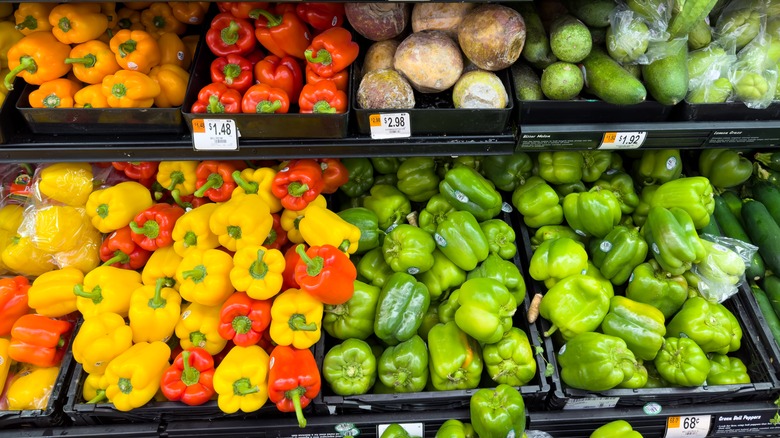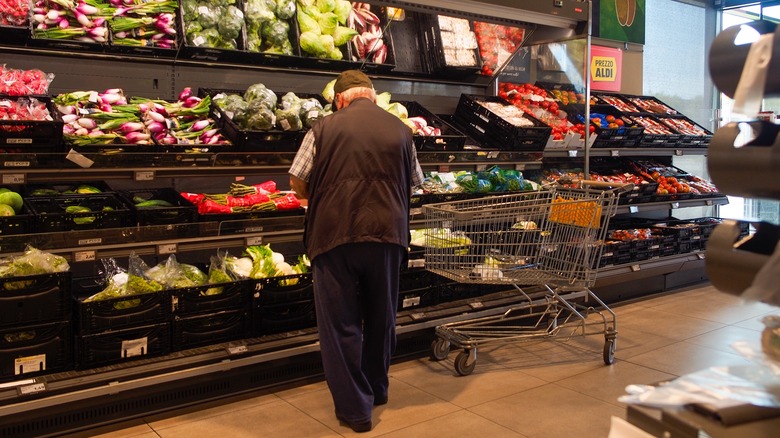Aldi And Walmart Recall Produce After A Possible Listeria Outbreak
A recent listeria contamination has resulted in a recall of over a dozen vegetables sold at various Walmart and Aldi locations across 13 states and 18 states total. The items in question were distributed between July 5 and July 12 by Wiers Farm, Inc., based in Willard, OH, and include cucumbers, peppers, green beans, and cilantro, among other fresh produce possibly infected with Listeria monocytogenes.
Both packaged vegetables and bulk items sold individually or by the pound are afflicted by the recall. A complete list of the potentially affected goods related to the recall (within which are a number of Kroger and Save-a-Lot locations as well), can be found on the FDA website. Fortunately, there have yet to be any consumer complaints or illnesses linked to the contamination, but public awareness is one factor in prevention.
This recall is an expansion of a previous limited withdrawal of cucumbers packed on July 5 or July 6 and distributed by Wiers Farm. That cancellation only affected products sold at Walmart in three states. The company did not grow the vegetables, but they were handled at its facilities. Weirs Farm is fully cooperating with the Ohio Department of Agriculture in their effort to resolve the situation.
How dangerous are the infected vegetables?
Listeriosis is a serious infection that can be deadly in some cases. It is generally caused by the consumption of food contaminated with the bacterium Listeria monocytogenes and can include symptoms such as fever, fatigue, and gastrointestinal problems, such as diarrhea. Children and adults over the age of 65, as well as those who are pregnant and folks with weakened immune systems, are most likely to become ill from a listeria infection.
Listeria can be eliminated from contaminated foods by heating them to 165 degrees Fahrenheit. However, because many of the affected products are commonly eaten raw, there is a greater cause for concern. Although all these items are currently beyond their average shelf life and out of distribution, consumers should double-check their refrigerators to see if they may have any of the potentially contaminated products hiding somewhere — though if you are correctly storing produce in the fridge drawers, it isn't likely you will have vegetables that old tucked away inside.
Listeria can't be detected by sight, smell, or taste, and it can survive refrigeration and even freezing temperatures. Foods exposed to the bacterium typically come in contact with infected animal waste, possibly from crop fertilization, though no specific details related to this contamination have been released.
Are other produce items in Walmart and Aldi safe?
So far, the items listed by the FDA are the only products of concern. However, given the potentially severe nature of a listeria infection, it is worth being cautious about any affected produce purchased from Walmart, Aldi, Kroger, Save-a-Lot, Shop N Save and others within Midwest and Northeast states. The CDC recommends people experiencing diarrhea from listeria infection drink plenty of fluids, and those with more severe symptoms should seek medical assistance. Listeriosis is usually treated with antibiotics, but treatments can vary depending on the severity of the infection.
While every effort to pull affected produce from shelves has been done, it's worth keeping these details in mind hunting these products in the relevant areas. When it comes to subjective preference, there are products worth buying and avoiding at Aldi as well as Walmart, but there is presently no need to be worried about either stores' veggies. All the potentially contaminated items have been discarded by distributors voluntarily and there is no reason to avoid supermarket produce in general. The FDA and Wiers Farm are working have quickly worked to address the distribution of affected products and ensure consumer safety.


